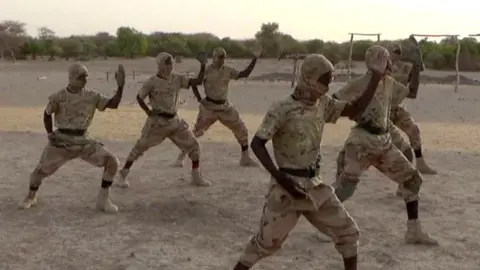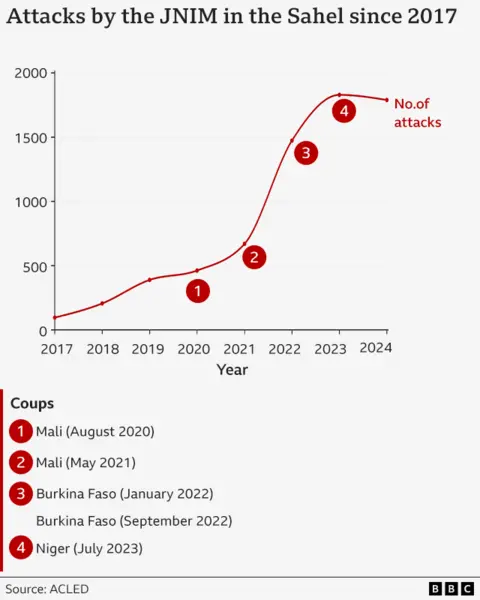BBC Information & BBC Monitoring
 Al-Zallaqa
Al-ZallaqaAl-Qaeda affiliate Jama’at Nusrat al-Islam wal-Muslimin (JNIM) is the principle group behind a surge in militant jihadist assaults sweeping throughout a number of West African nations, particularly Burkina Faso, Mali and Niger.
On 1 July, the group mentioned it had carried out a significant coordinated assault on seven army areas in western Mali, together with close to the borders with Senegal and Mauritania.
There may be rising concern concerning the affect JNIM might have on the steadiness of the area.
Burkina Faso, Mali and Niger have struggled to include the violence – and this is among the components that contributed to a number of army coups within the three Sahel nations during the last 5 years.
However just like the civilian governments they changed, the juntas are seemingly unable to stem the rising jihadist risk, particularly from JNIM.
What’s JNIM?
JNIM has turn into considered one of Africa’s deadliest jihadist teams inside the house of only a few years.
It was shaped in Mali in 2017, as a coalition of 5 jihadist militant teams:
- Ansar Dine
- Katibat Macina
- Al-Mourabitoun
- Ansar al-Islam
- The Sahara department of al-Qaeda within the Islamic Maghreb
These teams began collaborating after the French army pushed again a number of jihadist and separatist organisations that had been working in northern Mali in 2012. Ultimately, the leaders of the teams got here collectively to create JNIM.
Lately, they’ve expanded geographically, establishing new areas of operation.
JNIM is led by Iyad Ag Ghali, a former Malian diplomat who belongs to the Tuareg ethnic group. He was on the helm of the Tuareg rebellion in opposition to the Malian authorities in 2012 which sought to ascertain an unbiased state for the Tuareg folks referred to as Azawad. Deputy chief Amadou Koufa is from the Fulani group.
Analysts imagine the central management helps information native branches which function throughout the Sahel area of West Africa.
Whereas it’s tough to know precisely what number of fighters there are in JNIM’s ranks, or what number of have lately been recruited, consultants recommend it may very well be a number of thousand – principally younger males and boys who lack different financial alternatives in one of many poorest areas on this planet.
What does JNIM need?
The group rejects the authority of the Sahel governments, searching for to impose its strict interpretation of Islam and Sharia within the areas the place it operates.
Analysts say that in some areas, JNIM has been identified to impose strict costume codes, implement bans in opposition to music and smoking, order males to develop beards and stop ladies from being in public areas alone.
This model of Islam could be at odds with the faith as practised by native communities, says Yvan Guichaoua, a senior researcher on the Bonn Worldwide Centre for Battle Research.
“These practices are clearly breaking from established practices and positively not highly regarded,” he says.
“However whether or not it is enticing or not, additionally will depend on what the state is ready to ship, and there was quite a lot of disappointment in what the state has been doing for the previous years.”
Disillusionment with the secular justice system could make the introduction of Sharia courts interesting to some.
The place does JNIM function?
After its beginnings in central and northern Mali, JNIM quickly expanded its attain. Whereas its strongholds are in Burkina Faso, Mali and Niger, JNIM has additionally carried out assaults in Benin, Togo and at one level Ivory Coast.
It’s now operational all through Mali and 11 of Burkina Faso’s 13 areas, in line with the World Initiative in opposition to Transnational Organised Crime (Gi-Toc), a civil society organisation.
Within the final yr, Burkina Faso has turn into the epicentre of the group’s actions – predominately the northern and japanese border areas. That is, partly, due to divisions and defections within the nation’s army in addition to how deeply embedded the militants are within the native communities, in line with Beverly Ochieng, a senior analyst for safety consultancy agency Management Danger.
“JNIM have a capability to embed in native communities or to have the ability to use native grievances as a method of recruiting or profitable sympathy in the direction of their trigger,” she advised the BBC.
Are JNIM assaults growing in scale?
In latest months violent incidents have spiked in Burkina Faso to beforehand unseen ranges, in line with evaluation from BBC Monitoring’s jihadist media crew. Main assaults have additionally lately been carried out in Mali, Niger and Benin.
Within the first half of 2025, JNIM mentioned it carried out over 280 assaults in Burkina Faso – double the quantity for a similar interval in 2024, in line with information verified by the BBC.
The group has claimed to have killed nearly 1,000 folks throughout the Sahel since April, most of them members of the safety power or militias preventing alongside authorities forces, in line with BBC Monitoring information.
Virtually 800 of those have been in Burkina Faso alone. Casualties in Mali had been the subsequent highest (117) and Benin (74).
“The frequency of assaults in June is simply exceptional thus far,” says Mr Guichaoua. “They’ve actually stepped up their actions up to now weeks.”
The militants use quite a lot of ways designed to trigger most disruption, Ms Ochieng explains.
“They plant IEDs [improvised explosive devices] on key roads, and have long-range capabilities.
“They [also] goal safety forces in army bases, so quite a lot of their weapons come from that. They’ve additionally attacked civilians – in cases the place communities are perceived to be cooperating with the federal government.”
Starlink – an organization owned by Elon Musk which supplies web by way of satellites – has additionally been exploited by teams like JNIM to reinforce their capabilities, in line with a latest report by Gi-Toc.
The corporate supplies high-speed web the place common cell networks are unavailable or unreliable.
Militant teams smuggle Starlink gadgets into the nation alongside well-established contraband routes, G-toch says.
“Starlink has made it a lot simpler for [militant groups] to plan and execute assaults, share intelligence, recruit members, perform monetary transactions and keep contacts with their commanders even throughout energetic battle,” an analyst from Gi-Toc advised the BBC’s Give attention to Africa podcast.
The BBC has contacted Starlink for remark.
How is JNIM funded?
The group has a number of sources of earnings.
At one time in Mali, funds had been raised by kidnapping foreigners for ransom however few stay within the nation due to the deteriorating safety state of affairs.
Cattle-rustling has now turn into a significant supply of earnings, in line with an analyst from Gi-Toc. They didn’t wish to be named because it might threat their security in Mali.
“Mali is a giant exporter of cattle so it is easy for them to steal animals and promote them,” the analyst mentioned.
Analysis by Gi-Toc reveals that in a single yr in only one district of Mali, JNIM made $770,000 (£570,000) from livestock. Primarily based on this determine, JNIM may very well be incomes thousands and thousands of {dollars} from cattle theft.
JNIM additionally imposes varied taxes, in line with consultants.
“They tax the gold, however mainly tax something that goes by their territory, whether or not that is listed items or illicit items,” Gi-Toc says.
“There could be an extortion kind of tax, the place JNIM inform residents they should pay in return for defense.”
The militants have additionally been identified to arrange blockades, at which individuals should pay to go away and enter the realm, in line with Ms Ochieng.
What about efforts to battle them?
France’s armed forces had been on the bottom supporting the federal government in Mali for nearly a decade – with over 4,000 troops stationed throughout the Sahel area preventing teams that went on to kind JNIM, in addition to Islamic State within the Larger Sahara.
Whereas they’d some preliminary success in 2013 and 2014, reclaiming territory from the militants and killing a number of senior commanders, this didn’t cease JNIM’s progress after it was shaped.
“Counterinsurgency efforts have failed thus far due to this concept that JNIM could be crushed militarily, however it’s only by negotiation that the group will finish,” Gi-Toc’s analyst steered.
In 2014, Sahelian nations banded collectively to kind the G5 Sahel Activity Pressure, a 5,000-strong group of worldwide troops. Nonetheless, over the previous couple of years, Burkina Faso, Mali and Niger have withdrawn, undermining the duty power’s potential to sort out the insurgency.
Minusma, the UN peacekeeping power – whereas not a counter-insurgency effort – was additionally in Mali for a decade to assist efforts, nevertheless it left the nation on the finish of 2024.
What affect have army coups had on JNIM?

Navy coups occurred in Mali in 2020 and 2021, Burkina Faso in 2022 and Niger in 2023.
Poor governance beneath the army juntas in Burkina Faso, Mali and Niger subsequently has allowed militant teams like JNIM to flourish, in line with analysts.
These juntas had been swift to inform French troops to go away, changing them with Russian assist and a joint power shaped by the three Sahelian nations.
Although Russian paramilitary group Wagner has withdrawn its troops from Mali solely, Africa Corps, a Kremlin-controlled paramilitary group, will stay in place.
In Burkina Faso, a so-called “volunteer” military, launched in 2020 earlier than the army takeover, is one technique getting used to battle militants. Junta chief Ibrahim Traoré has mentioned he needs to recruit 50,000 fighters.
However consultants say many of those volunteers are conscripted by power. Insufficient coaching means they typically endure heavy casualties. They’re additionally typically a goal for JNIM assaults.
The army juntas in Burkina Faso and Mali have additionally been accused by human rights organisations of committing atrocities in opposition to civilians, notably ethnic Fulanis. Human rights group say the federal government typically conflates the Fulani group with Islamist armed teams, which has furthered hampered peace efforts.
Between January 2024 and March 2025, the army authorities and their Russian allies had been liable for 1,486 civilian casualties in Mali, in line with Gi-Toc.
This excessive violence in opposition to civilians has generated anger in the direction of the federal government, fuelling additional recruitment for JNIM.
You may additionally be thinking about:
 Getty Photos/BBC
Getty Photos/BBC